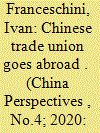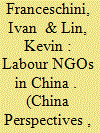| Srl | Item |
| 1 |
ID:
175475


|
|
|
|
|
| Summary/Abstract |
Although much has been written about China’s Belt and Road Initiative (BRI), so far little attention has been paid to how Chinese investment is affecting workers in BRI-targeted countries. To explore this dimension of global China, this paper examines the labor rights situation at Chinese-owned construction sites in Sihanoukville, a city on the Cambodian coast that in recent years has been described as embodying the worst excesses of Chinese foreign investment. Based on extensive interviews with Chinese and Cambodian workers, this paper argues that while Chinese-owned construction sites in Cambodia are grounded in a labor regime as exploitative as those in mainland China, workers’ agency in the former case is further undermined by their employers’ adoption of a policy of labor force dualism that draws boundaries between Chinese and Cambodian workers.
|
|
|
|
|
|
|
|
|
|
|
|
|
|
|
|
| 2 |
ID:
176383


|
|
|
| 3 |
ID:
176380


|
|
|
| 4 |
ID:
169210


|
|
|
|
|
| Summary/Abstract |
Since their appearance in the mid-1990s, Chinese labour NGOs have mostly focused on disseminating labour law and guiding labour disputes through official channels. In so doing, they have assisted the Chinese Communist Party in achieving its paramount goal of maintaining social stability. In line with this approach, activists in these organizations have traditionally framed their work in terms of “public interest” or “legality,” both of which resonate with the hegemonic discourses of the Party-state. However, earlier this decade a minority of Chinese labour activists began to employ some new counterhegemonic narratives centred on the experience of the labour movement and the practice of collective bargaining that attempted to recode the proletarian experience outside of its official representation. In this paper we analyze this discursive shift through the voices of the activists involved, and argue that the rise of these new counterhegemonic voices was one of the reasons that led to the Party-state cracking down on labour NGOs.
|
|
|
|
|
|
|
|
|
|
|
|
|
|
|
|
| 5 |
ID:
166100


|
|
|
|
|
| Summary/Abstract |
Since their appearance in the mid-1990s, Chinese labour NGOs have mostly focused on three kinds of activities: establishing workers’ centres; carrying out outreach programs on labour rights; and conducting social surveys and policy advocacy. Some scholars have strongly criticised this approach, considering it excessively unbalanced towards an individualistic and narrowly legalistic view of labour rights and thus in line with the political agenda of the Party-state. Still, in the past few years, as labour conflict intensified, a handful of labour NGOs have moved forward to adopt a more militant strategy focussed on collective bargaining and direct intervention into worker collective struggles. Based on dozens of interviews with labour activists and workers and detailed analysis of two case studies of NGO-fostered collective labour mobilisation in Southern China in 2014-2015, this paper will outline the personal and political reasons that motivated these organisations to move beyond a narrow legalistic approach and turn towards collective struggles. It will also describe the strategies that Chinese labour activists have adopted in dealing with collective cases. We will conclude by examining the main challenges that labour activists in China have to face when dealing with labour unrest and by questioning the sustainability and feasibility of this new approach in the current political climate.
|
|
|
|
|
|
|
|
|
|
|
|
|
|
|
|
| 6 |
ID:
132956


|
|
|
|
|
| Publication |
2014.
|
| Summary/Abstract |
The narrative about Chinese NGOs active in defending migrant workers' rights describes these organizations as increasingly powerful instruments through which Chinese people take part in public affairs, develop and articulate personal interests, and collectively form a more active and participatory citizenry. This article challenges not only the idea of labour NGOs as a progressive force for political change, but also the belief - widely shared among the international labour movement - that these organizations are sprouts of independent unionism in China. After a short overview of the historical process which led to the birth of labour NGOs in China, this article analyses the relations between these NGOs and four fundamental actors - the state, the workers, international donors and other NGOs - and argues that many of these organizations are struggling as a consequence of a substantial lack of "social capital."
|
|
|
|
|
|
|
|
|
|
|
|
|
|
|
|
| 7 |
ID:
146638


|
|
|
|
|
| Summary/Abstract |
In the spring of 2010, the strike of the Honda workers in Nanhai instigated an on-going discourse on the “rights awakening” of the “new generation of migrant workers.” Since then, much has been written about these young workers, generally described as more pro-active and ready to stand up against their employers than the older and more subservient generation. Drawing from statistical findings from two factory-gate surveys in the metal mechanics and garment sectors in Shenzhen, this paper tests two hypotheses: (a) that workers of the younger generation are more cognizant of their legal rights than older workers; (b) that the younger generation wants to work fewer hours and to enjoy life more. We argue that this popular image of the younger generation of migrant workers is one-dimensional and reductive, as it focuses only on generational differences as an explanatory factor for worker activism, while ignoring other issues such as types of industries and payment systems. In this paper, we purport that these elements play important roles in shaping the attitude of this younger generation toward their work and rights.
|
|
|
|
|
|
|
|
|
|
|
|
|
|
|
|